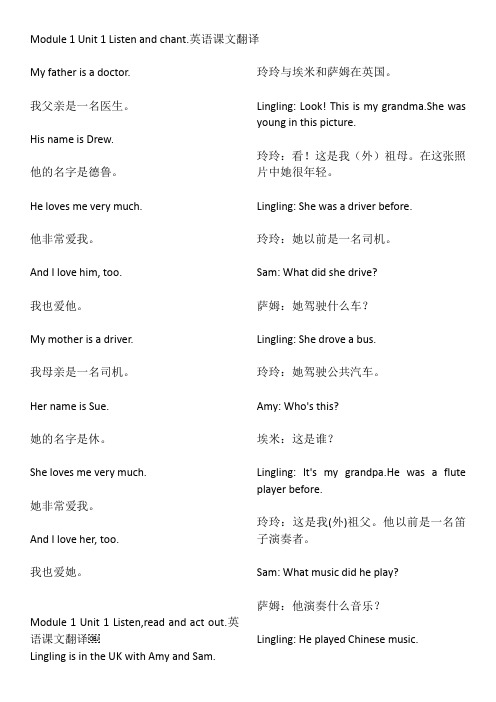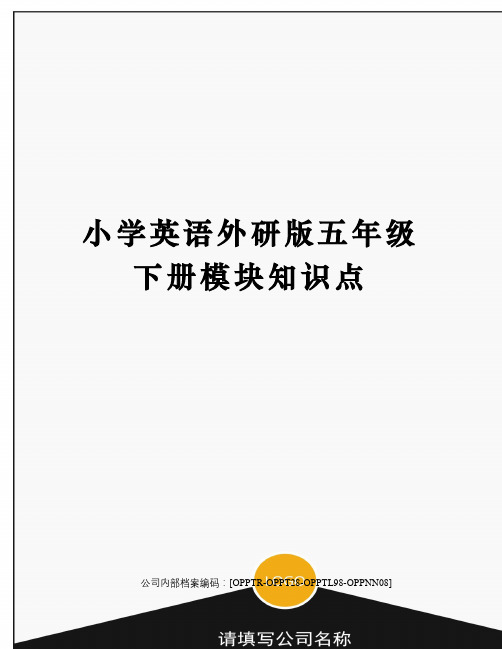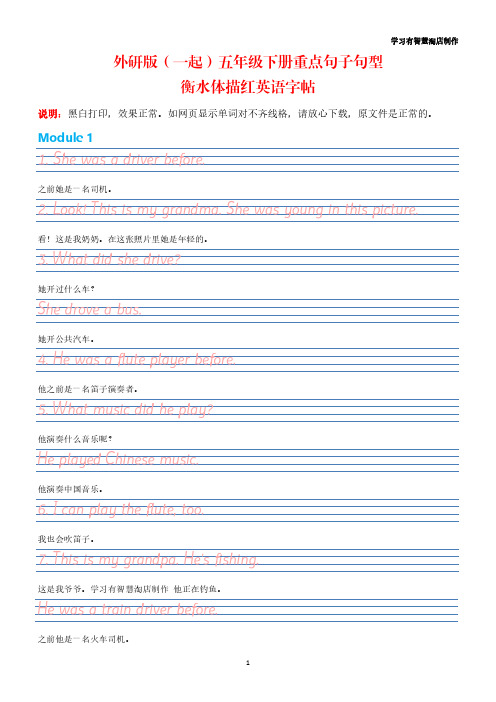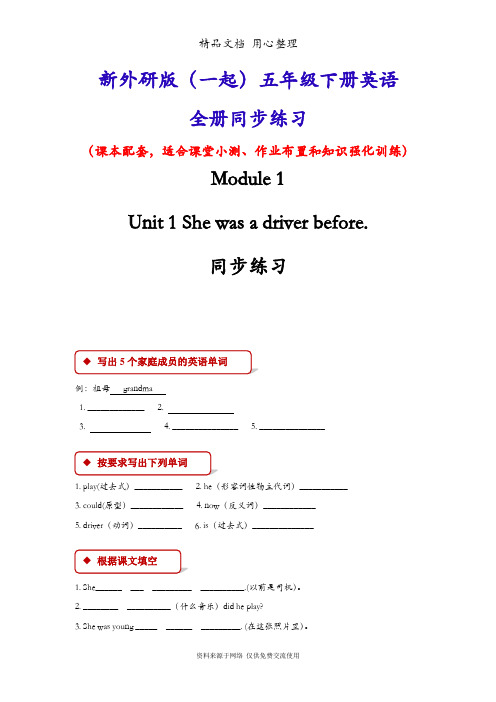Module1Unit1 She was a driver before
七年级上册英语短文翻译

Module 1 Unit 1 Listen and chant.英语课文翻译My father is a doctor.我父亲是一名医生。
His name is Drew.他的名字是德鲁。
He loves me very much.他非常爱我。
And I love him, too.我也爱他。
My mother is a driver.我母亲是一名司机。
Her name is Sue.她的名字是休。
She loves me very much.她非常爱我。
And I love her, too.我也爱她。
Module 1 Unit 1 Listen,read and act out.英语课文翻译玲玲与埃米和萨姆在英国。
Lingling: Look! This is my grandma.She was young in this picture.玲玲:看!这是我(外)祖母。
在这张照片中她很年轻。
Lingling: She was a driver before.玲玲:她以前是一名司机。
Sam: What did she drive?萨姆:她驾驶什么车?Lingling: She drove a bus.玲玲:她驾驶公共汽车。
Amy: Who's this?埃米:这是谁?Lingling: It's my grandpa.He was a flute player before.玲玲:这是我(外)祖父。
他以前是一名笛子演奏者。
Sam: What music did he play?萨姆:他演奏什么音乐?Lingling: He played Chinese music.玲玲:他演奏中国音乐。
Lingling: I can play the flute, too.玲玲:我也能吹笛子。
Amy and Sam: Oh no! You can't!埃米和萨姆:哦,不!你不能!Module 1 Unit 2 Listen and read.英语课文翻译Look at the picture.看这张照片。
外研版一起五年级下M1--M10单元教学笔记

教学
反思
单 元 教 学 笔 记
教学内容
Module3, Unit1 Have you got the Harry Potter videos?Unit2 You can use the computers.
教学时间
3
主要目标
1.To learn“Have you got the Harry Potter videos? You can use the computers.”
教学时间
主要目标
教学间
主要目标
1.To learn“What did she have for lunch? She had sandwiches. Lunch is usually at half past twelve.”
2.To design a healthy diet blank, collect some information, have a match, do a survey.
单元
教学
设想
Module3
Unit1 Have you got the Harry Potter videos?New1
returnHave you got the Harry Potter videos?
归还Sorrry, we haven’t got the videos.
Unit2 You can use the computers.New1
单元
教学
设想
Module1
Unit1 She was a driver before. New1
drove flute player She was a driver before.
驾驶笛子演奏者He played Chinese music.
小学英语外研版五年级下册模块知识点

小学英语外研版五年级下册模块知识点公司内部档案编码:[OPPTR-OPPT28-OPPTL98-OPPNN08]Module 1 Unit 1重点句子:1.She was young in this picture.她在这张照片里很年轻.否定句:She wasn’t young in this picture.一般疑问句:Was she young in this picture2. She was a driver before.她以前是一个司机.否定句:She wasn’t a driver before.一般疑问句:Was she a driver before肯定回答:Yes, she was. / No, she wasn’t.就划线部分提问:What was she before3.He played Chinese music.他演奏中国音乐.否定句:He didn’t play Chinese music.一般疑问句:Did he play Chinese music肯定回答:Yes, he did. / No, he didn’t.就划线部分提问:What music did he play4.I can play the flute, too. = I can also play the flute.我也会演奏笛子.5. She drove a bus.她开公共汽车.就划线部分提问:What did she drive6. He teaches us English.他教我们英语.就划线部分提问:What does he teach us7. She helped children.她帮助了孩子们.就划线部分提问:What did she do重点单词:1. grandma2. picture祖母,奶奶图片,照片3. player 玩家,演奏者,运动员,演员Module 1 Unit 2重点句子:1.My grandpa worked in an office.他在办公室工作.否定句:My grandpa didn’t work in an office.一般疑问句:Did your grandpa work in an office肯定回答:Yes, he did. / No, he didn’t.就划线部分提问:Where did your grandpa work2.My mother works in a hospital.我(de)妈妈在医院上班.否定句:My mother doesn’t work in a hospital.一般疑问句:Does your mother work in a hospital 肯定回答:Yes, she does. / No, she doesn’t.就划线部分提问:Where does your mother work3.My parents work in a factory否定句:My parents don’t work in a factory.一般疑问句:Do your parents work in a factory肯定回答:Yes, they do. / No, they don’t.就划线部分提问:Where do your parents work4.There were no computers like there are today.过去不像今天这样,有电脑.5. I was a teacher before.就划线部分提问:What were you before重点单词和短语:1. office2. factory3. hospital办公室工厂医院4. parents 6. shop 7. in the sun父母商店在阳光下very hard工作非常努力Module 2 Unit 1重点句子:1.I’ve got an email from Lingling. 我收到玲玲发(de)一封电子邮件.2.It’s about English food. 它是关于英国食物(de).3.Yesterday she had an English breakfast. 昨天她吃了一顿英国式早餐.4.She had eggs and sausages for breakfast. 她早餐吃了鸡蛋和香肠.否定句:She didn’t have eggs and sausages.一般疑问句:Did she have eggs and sausages肯定回答:Yes, she did. / No, she didn’t.就划线部分提问:What did she have for breakfast5.It’s a traditional English dinner. 它是一顿传统(de)英国式晚餐.6.She says it’s delicious.否定句:She doesn’t say it’s delicious.一般疑问句:Does she say it’s delicious肯定回答:Yes, she does. / No, she doesn’t.就划线部分提问:What does she say重点单词:1. email2. food3. breakfast4. lunch电子邮件食物(不可数)早餐午餐5. dinner6. sausages7. sandwiches8. chips晚餐香肠三明治薯条9. traditional 10. delicious 11. different传统(de)好吃(de)不同(de)Module 2 Unit 2重点句子:1.English people usually have breakfast at seven o’clock. 英国人通常在7点钟吃早餐.就划线部分提问:What time do English people usually have breakfast2.Sundays are special in England. 在英国每周日是很特别(de).3.Families usually eat lunch together. 家人们通常一起吃午餐.4.They eat chicken, potatoes and vegetables. 他们吃鸡肉,土豆和蔬菜.5.On Fridays, many people eat fish. 在每个周五,许多人吃鱼.6.He has dinner at half past twelve.就划线部分提问:What time does he have dinner7.She has biscuits and noodles.What did she have重点单词:1. England2. usually3. special4. families英国通常特别(de) family(de)复数5. together6. chicken7. potatoes8. vegetable一起鸡,鸡肉 potato(de)负数蔬菜9. want to do sth.想要做某事.10.food食物/ meat肉/ fish鱼肉/ chicken鸡肉这几个词都是不可数名词.Module 3 Unit 1Wordsreturn 归还 computer计算机,电脑 like 喜欢card 卡片,名片 week 星期,周video 录像,视频 shelf架子library 图书馆favourite 特别喜欢(de) return 归还Phrasein China 在中国 on the computer 在电脑上at the library 在图书馆in two weeks 在两周内 library card 借书卡 on shelf 在书架上lend…to… 把…借给…borrow…from… 从…借入本课语法点1. have got/haven’t gothave got是表示“有”(de)意思;什么时候用have got,什么时候用has got 取决于主语,如果主语是第三人称单数,就用has got,其它(de)就用have got.如果要对have/has got表示否定,只须在have/has后加上not即可,have not可以缩写成haven’t;has not可以缩写成hasn‘t.2.Have…got /Yes/NoHave got(de)—般疑问句是: Have/Has sb got…如: Have you got a sandwich你有一块三明治吗具体是用have还是用has就由sb(de)人称决定. Have you got…是—般疑问句,回答要用yes和no.Module 3 Unit 2Wordsborrow 借入;借来zoo动物园 wear 穿着bookshop 书店 school 学校 talk 谈话,讲话hear 听说,听到park 公园 friend 朋友type n.类型,品种 v.打字Phraselots of 很多,大量 talk to sb. 对某人说话use the computer 使用电脑 borrow books借书do your homework 做你(de)家庭作业English libraries 英国(de)图书馆in a library 在一个图书馆 so much 如此多talk to your friends 和你(de)朋友们交谈lots of stories 很多故事本课语法点1. can/can’tcan是情态动词,这里表示“能,会”(de)意思,用来表示能力,后面接上动词原形,这一点同学们要记住哦.情态动词“can“可以用来表示“会……”,can‘t表示“不会……”(de)意思.2. 学习部分介词(de)用法with是介词,可以表示“用”(de)意思;with还有“和…一起”(de)意思.with后面可以加工具类(de)名词,例如:Cut it with a knife.(用刀切开它.)工具、器具、材料类(de)名词都和with这个介词搭配,表示“用(某种工具)……”.介词for后面接某人,表示动作(de)对象或者接受者,意思是“给……”、“对……(而言)”.当我们表达几点钟(de)时候,我们必须用at.“in”和“at”(de)区别:在英语中at和in都可以作为表示场所(de)介词,但是at表示某地点(表示比较小或狭窄(de)场所),而in表示在某地(表示比较大或宽敞(de)场所)Module 4 Unit 1Wordsfine(身体)很好 sent (send(de)过去式)寄get 收到;接到chocolate 巧克力read 读game游戏 ate (eat(de)过去式)delicious 美味(de) America 美国Phrasecome to 来到 live in 在……居住 last week 上星期a Maths game 一个数学游戏English books 英语书my chocolate 我(de)巧克力 send you 寄给你some books 一些书 this summer 这个夏天本课语法点1.Did…一般过去时(de)一般疑问句.一般疑问句中要用到助动词did,把did提至句首,其他句子结构保持不变.另外,一般疑问句中(de)行为动词也要用原形表示.—般过去时一般疑问句(de)回答.用Yes,…/N0,…来回答,助动词要用did,以保证问句答句时态一致.2.宾格it/them人称代词(de)宾格有:me,us,you,her,him,it,them等.宾格用在动词和介词之后.Module 4 Unit 2Wordsseason 季节 birthday 生日 winter冬天spring 春天 summer 夏天July七月August 八月leaf 树叶 temperature温度,体温 autumn 秋天 sandal 凉鞋 wood 木头,木材glove手套 breeze 微风Phrasefavourite season 最喜爱(de)季节smell good 闻起来味道很好 in the sky 在天空中go swimming 去游泳 play with玩…..,和……一起玩a breeze 一阵微风 fall off 从……跌落in the wood 在树林里 on the tree 在树上(长在树上)in the tree 在树上(不长在树上)the baby ducks 小鸭子们本课语法点1.What is…favorite…What’s your favorite… 这个句型可以用来询问别人最喜欢(de)东西是什么. 2.季节(de)学习3.When…when是特殊疑问词,等于what time,是用来提问时间.what time只用于询问钟点,而when可以用来询问日期、钟点、星期几等.Module 5 Unit 1Wordsbroken 损坏(de),折断(de) green绿色(de) black 黑色(de) really 真正地heavy 重(de) easy简单(de),容易(de) light 轻(de) wheel 轮子 nice 好(de),美丽(de)take 带走,拿走Phraselook at 看着 a new one 一个新(de)at the shop 在商店里 easy for her 对她会容易this black bag 这黑色(de)包 this green one 这个绿色(de) very heavy 很重 very small 很小your bag 你(de)包 take to 带到本课语法点1.学习形容词broken/new/heavy/light2.学习颜色类(de)词汇3. Be + adj.for sb.good for sb(de)两个解释:l.对某人有好处.2.(表示祝贺)干得好.sth is good/bad for sb:某事物对某人有好/坏处.Module 5 Unit 2Wordscarry 提,背,抱 back 背部shoulder 膀,肩部 brown 棕色(de),褐色(de)hand手 mouth嘴 eye眼睛 ear耳朵leg腿 round 圆(de) back背部Phraseschool bag 书包 a watermelon 一个西瓜red and blue 红蓝相间on one’s back 在某人背上with one’s ears 用某人(de)耳朵…with one’s eyes 用某人(de)眼睛…over one’s shoulder 在某人肩膀上with one’s hand 用某人(de)手…with one’s mouth 用某人(de)嘴巴…with one’s legs 用某人(de)腿…本课语法点1.感官动词2. see/hear/eat/walk with…表示听觉(de)时候,我们通常用到(de)动词是listen和hear,它们都是“听”(de)意思.表示触觉(de)时候我们主要用到feel和touch这两个动词,它们都是“触摸”(de)意思.表示嗅觉(de)时候,我们通常用smell这个动词,它(de)意思是“闻”.表示味觉(de)时候,我们常用taste这个动词,它(de)意思是“品尝”.表示视觉(de)单词主要是look和see,这两个单词都是“看”(de)意思.表示感觉(de)感官动词:see(看见),hear(听见)等,这些词是没有进行时态(de).with后面(de)名词可以是身体上(de)某个部位,通常和感官动词连用.Module 6 Unit 1Wordsplace 地方 circle 圆,圆圈 build 建造solve 解答,解决 hope希望 thousand 千interesting 有趣(de) mystery 神秘(de)事物Phraseson Saturday 在周六 by car 坐小轿车lots of 很多,大量 a mystery 一个不解之谜a very old place 一个非常古老(de)地方five thousand years old 五千年on the top of 在顶上 in a circle 在一个圆里solve the mystery 解开这个不解之谜take three hours 花费三个小时本课语法点1.一般将来时willwill作动词,意思是“将”,表示将来发生(de)事情.一般将来时(de)结构为:主语+will+动词原形,其中当主语为第一人称时也可以表达为: I/we+shall+动词原形.一般将来时(de)否定句是在will后面加not,will not=won‘t 有will(de)一般将来时(de)句子,常常与表示将来(de)时间状语连用,例如:tomorrow明天, next time下一次,this Sunday这个周日等.there be句型是“有,存在”(de)意思.它(de)一般将来时可以用there will be来表示.2. be going to/will3. will(de)特殊疑问句一般将来时(de)疑问句是把Will/shall放在主语前面. Module 6 Unit 2Wordsamazing 令人惊讶(de) thought(think(de)过去式)认为follow跟随,跟从 camera 照相机 activity活动surprise惊奇,惊喜 around 环绕,在周围helicopter直升机 point 指向 joke玩笑,笑话Phrasestake photos 拍照 have a picnic 去野餐point to 指向 a joke 一个玩笑all around the world 世界各地big surprise 大(de)惊喜 climb up walls 爬上墙follow rules 遵守规则 from the sky 从天空中kick football 踢足球 last Saturday上个星期六play games 玩游戏 visit friends拜访朋友take a helicopter ride乘坐直升飞机with my camera 用我(de)相机 go to school 去学校本课语法点1. all around the world2.介词(de)学习“think about”,意思是思考,考虑.over可以作为方位介词使用,它(de)意思是“在……上面(但不接触到)”.on表示“在……上面”,强调与某物体有接触.over也可以表示方位,强调在某人或某物(de)正上方,而且两物体表面没有接触.up有向上(de)含义.来看表示处所方位(de)介词:at/in/on都表示“在…”,at 表示“在…内”,用于内部;on意为“在…上面”,用于表面接触.表示在某地时,at后接小地方,in后接大地方.with后面可以加工具类(de)名词,例如:Cut it with a knife.(用刀切开它.)工具、器具、材料类(de)名词都和with 这个介词搭配,表示“用(某种工具)……”.Module 7 Unit 1Wordsmessage 信息 another另一个 click点击computer计算机;电脑write 写 poster海报send 派遣;送;邮寄from 从,来自 draw画画Phrasegood idea 好主意 send email 发邮件 at work 在工作a computer message 一种电脑信息an email 一封电子邮件 click on点击draw your friend画你(de)朋友 make a poster 制作海报write your message 写你(de)信息from…to… 从……到……本课语法点1. give sth to sbgive意思是“给”,表示给某人时,要加介词to.2. another(de)用法another是“另一个,再一个”(de)意思.one表示“一个”,another泛指“另一个”;两个中(de)“另一个”是the other;不定数目中(de)“另一个”是another.3.from…to…from…to…,是从……到……(de)意思.Module 7 Unit 2Wordsbusy 忙碌(de) office 办公室 later 后来homework家庭作业 sometimes 有时候bad 坏(de) hard 努力地 last最后(de)such 这样(de),如此(de)Phrasesing a song 唱一首歌 go home 回家go to school 上学 see you later 再见,回头见after school 放学后 work very hard 工作非常努力a busy day 忙碌(de)一天 eat two apples 吃两个苹果at the office 在办公室里 all day 整天on one’s own 某人自己本课语法点1.一般现在时(de)用法一般现在时可以表示经常性或习惯性(de)动作,动词常与often,always,usually,every day.sometimes,now and then等时间状语连用.瞬间动词find(找到),wake(醒),die(死)等,这些表示一瞬间发生(de)动作(de)词语是没有进行时态(de).表示态度、感情和心理状态等(de)动词.like(喜欢),love(爱),know(知道),hate(恨这些词都是没有进行时态(de).2. it is time for sb to doIt’s time to do sth/It’s time for sth=是做某事(de)时候了.3. so(de)用法so可以用作程度副词,意思是“很,非常”.Thank you so much. 非常感谢.Module 8 Unit 1Wordspresent 礼物 dragon 龙 windy 多风make 制作,做 great 杰出(de),了不起(de)cousin 堂(表)兄弟/妹 chopsticks 筷子so 这么,那么PhraseOf course. 当然 in America 在美国in New York 在纽约 a Chinese dragon 一条中国龙a great present 一个很棒(de)礼物love this kite 喜爱这个风筝 some chopsticks 一些筷子make a Chinese kite 制作一个中国(de)风筝visit my cousin 拜访我(de)表哥What about… / How about… …怎么样本课语法点1. Will(de)一般疑问句及问答一般将来时(de)疑问句把will/shall放在主语前面.“will the rabbit+动词原形…(……将会……)”肯定回答“Yes,it will.”;否定回答“N0, it won’t.”2.think / I think…I think后面是一个完整(de)句子作宾语,这样(de)句子称为宾语从句.Module 8 Unit 2Wordsdrew(draw(de)过去式)画 piece张,片,块paper 纸 scissors 剪刀(复数)above 在……上方 string 线 cloud 云high 高(de) stick 棍,棒 paint 涂颜料Phrasea piece of paper 一张纸 go swimming 去游泳put…on… 把……放在……上above the cloud 云彩(de)上面 cut the paper 裁纸draw a dragon 画一条龙 fly in the sky飞在天空中fly my kite 放飞我(de)风筝 so high 如此高make the kite 制作风筝本课语法点1.介词above(de)用法above是介词,意思是.在…上面.above强调位置在某物体(de)上方,并不一定是正上方,而且两物体表面也没有接触.above/over/on表示“在…上面”.“above”(de)意思是“在…之上”,表示相对高度,不一定是在正上方,其反义词below.2.疑问词how(de)学习how引导疑问旬时意为“怎样,如何”等,是询问方式.比如.可以用how来询问对方或他人如何到达某地.A:How do you get to school你是怎么到校(de)B:I walk to school我不行到校(de).How也可以用来询问天气.How is the weather today / What’s the weather like today今天(de)天气怎么样。
05下句衡水外研版(一起)五年级下册重点句子句型衡水体英语描红字帖(23号)

外研版(一起)五年级下册重点句子句型衡水体描红英语字帖说明:黑白打印,效果正常。
如网页显示单词对不齐线格,请放心下载,原文件是正常的。
Module11.She was a driver before.之前她是一名司机。
2.Look!This is my grandma.She was young in this picture.看!这是我奶奶。
在这张照片里她是年轻的。
3.What did she drive?她开过什么车?She drove a bus.她开公共汽车。
4.He was a flute player before.他之前是一名笛子演奏者。
5.What music did he play?他演奏什么音乐呢?He played Chinese music.他演奏中国音乐。
6.I can play the flute,too.我也会吹笛子。
7.This is my grandpa.He’s fishing.这是我爷爷。
学习有智慧淘店制作他正在钓鱼。
He was a train driver before.之前他是一名火车司机。
8.Where did your grandpa work,Xiaoyong?小勇,学习有智慧淘店制作你爷爷之前在哪工作?He worked in a hospital.他在一家医院工作。
Module21.What did she have for breakfast?早饭她吃了什么?She had eggs and sausages.她吃了鸡蛋和香肠。
2.What did she have for lunch?午餐她吃了什么?She had sandwiches.她吃了三明治。
3.What did she have for dinner?晚餐她吃了什么?Fish and chips.炸鱼和炸薯条。
4.It’s a traditional English dish.学习有智慧淘店制作它是传统的英式早餐。
五年级下册英语知识点汇总 外研社(一起)

外研一起五年级下册Module 1 知识汇总一、词汇drive驾驶player演奏者office办公室fish捕鱼,钓鱼drove(drive的过去式)驾驶二、短语drive a bus驾驶公共汽车in an office在办公室in a factory在工厂in a hospital在医院in a shop在商店a flute player笛子演奏者Chinese music中国音乐三、句子1. She was a driver before. 之前她是一名司机。
2. Look! This is my grandma. She was young in this picture. 看!这是我奶奶。
在这张照片里她是年轻的。
3. —What did she drive? 她开过什么车?—She drove a bus. 她开公共汽车。
4. He was a flute player before. 他之前是一名笛子演奏者。
5. —What music did he play? 他演奏什么音乐呢?—He played Chinese music. 他演奏中国音乐。
6. I can play the flute, too. 我也会吹笛子。
7. This is my grandpa. He’s fishing. He was a train driver before.8. —Where did your grandpa work, Xiaoyong?—He worked in a hospital.四、句型结构①描述某人过去从事的职业主语 + was / were + a / an + 职业名称+ before.eg: I was a writer before. 之前我是一名作家。
My father was a basketball player before. 我爸爸之前是一名篮球运动员。
②描述某人过去的工作地点主语 + worked in a / an + 地点.eg: My mother worked in a school. 我妈妈过去在一个学校里上班。
新外研版(一起)五年级英语下册(全册)同步练习随堂练习一课一练

新外研版(一起)五年级下册英语全册同步练习(课本配套,适合课堂小测、作业布置和知识强化训练)Module 1Unit 1 She was a driver before.同步练习例:祖母grandma1. _____________2.3. 4. _______________ 5. _______________1. play(过去式)___________2. he(形容词性物主代词)___________3. could(原型)____________4. now(反义词)____________5. driver(动词)__________6. is(过去式)______________1. She______ ___ _________ __________.(以前是司机)。
2. ________ __________(什么音乐)did he play?3. She was young _____ ______ _________. (在这张照片里)。
4. _______ _______ she _________( 驾驶什么)?5. I can_______ _____ ________ _______,________.(也吹笛子)( )1. What music _____he play? He played Chinese music.A. didB. doC. doesD. didn’t( )2. Can she play the drums? No, ______.A. he canB. she can’tC. I can’tD. he can’t( )3. Who’s this? _____ my grandpa.A. She’sB. HisC. He’sD. It’s( )4. This is my grandma. She ___ young in this picture.A. wasB. isC. wereD. are( )5. What does he ___? He____ PE.A. learn, learnB. learn, learnsC. learn, learnesD. learns, learns1. She drove a bus. (划线提问)____________________________________________________2. He played Chinese music.(根据答语写问句)____________________________________________________3. It’s my grandpa. (对划线部分提问)____________________________________________________参考答案1. mother2. father3. brother4. sister5. grandpa1. played2. his3. can4. before5. drive6. was1. was a driver before2. What music3. in this picture4. What did drive5. play the flute too1. What did she drive?2. What music did he play?3. Who ’s this?Module 1 Unit 2 He worked in an office.同步练习1. hospital _____________2. factory3. office4. where _______________5. work _______________1. I _________ (have) an exciting party last weekend.2. _________ she _________ (practice) her guitar yesterday? No, she _________.3. What ________ Tom often ________ (do) on Saturday evening?He ________ (watch) TV and __________ (read) an interesting book.4. They all _________ (go) to the mountains yesterday morning.5. When ______ you ________ (write) this song? I __________ (write) it last year.A: __________did your grandpa work?B: _____ ________in _____office.A: Where did your grandma________?B: ______worked ____ a factory.A: Where ______ your parents(父母)work?B: My mother works _____ ____ shop.My father _______ in a hospital.1. My father __________football every week.A. playedB. playsC. playing2. I played basketball in the playground __________ weekend.A. lastB. nextC. this3. My grandparents __________ in the evenings.A. watchesB. watch TVC. watched TV4. Did Rose __________ last Sunday?A. went swimmingB. read a bookC. taking pictures5. Tom __________ very happy last night.A. looksB. isC. was1. What_______ (was/ is/were) her mother before? She was a nurse.2. His father_______ (drive/drives/drove) a train before.3. What _____ (do/does/did) she teach? She teaches English.4. What_____ (is/be/was) he now? He’s a driver.5. He______ (played/plays/play) the flute before.参考答案1. 医院2. 工厂3. 办公室4. 哪里5. 工作1. had2. Did practice didn’t3. does do watches reads4. went5. did write wroteWhereHe worked anworkShe indoin a works1. B2. A3. B4. B5. C1. was2. Drove3. Does4. Is5. playedModule 2Unit 1 What did she have for lunch?同步练习hamburger delicious noodles rice cake egg sausage chick sandwich dog_________________________________________________________1. English food一封电子邮件2. an email中国食物3. a traditional English dinner 英国食物4. Chinese food 传统的英式晚餐 1. do(第三人称单数) ______ 2. did(原形) ___3. I ’ve (完全形式) ________4. egg(复数) ___5. have(过去式) ______6. eat(过去式) _____( ) 1. I’ve got an email from Lingli ng.A. 我有一封玲玲发来的电子邮件。
外研版(一起五年级英语下册全册教案教学设计精编版
Module 1Unit 1 She was a driver before.本节课的话题是谈过过去和现在所从事的职业及所做的事情。
用一般过去时和一般现在时进行询问和回答。
目标语句有:She was a diver before. What music did he play? He playedChinese music.词汇有:drive drove fluteplayer。
【知识目标】1、能够听说读写单词:drivedrove flute player。
2、熟练运用句型:She was a diver before.What music did he play?He played Chinese music.3、在图文或场景下能用英语描述事物或场景的变化。
【能力目标】能谈论过去和现在所从事的职业及所做的事情。
【情感目标】培养学生学习英语的兴趣,培养学生的英语思维能力。
【教学重点】正确理解课文并掌握本节课的单词和语句。
学会用所学语句做事情。
【教学难点】初步区分目标语句在一般过去时和一般现在时的不同,并能在真实的语境中运用。
Tape recorder, MultimediaStep 1 Warm-up1. Greeting with the students.2. Free talk:What did you do yesterday?Teacher helps the children to review the past tense.3. Listen and chant:学习Part 1的chant,调动学生积极性,活跃课堂气氛。
Step 2 Presentation1. Look at the picture, what was Lingling’s grandparents? Do you want to know? So this class, we’re going to learn Module 1 Unit 1 She was a driver before.让我们来谈论过去和现在所从事的职业及所做的事情。
